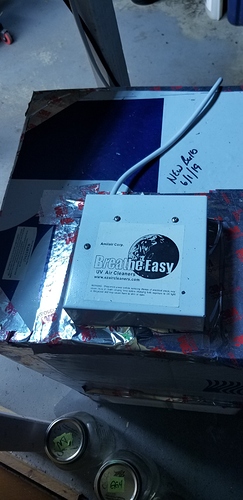sum yall. Had a ? will uv light kill mold in distillate. im thinking im going to do a base test at digipath labs then uv the same oil and see if any thing went down.
Which type of uv?
Uva
Uvb
Uvc
How did you end up with mold in your distillate? Mold requires water…
its distillate that was ran that tested positive for mold just trying to figure out ways to rid it.
Uvc kills spores and such. Not sure what it would do to the thc content.
Maybe try out a test. Make a small box, drop in a uvc light (I found 13w ones for 53.00, I use these), place test sample inside. Set for say 1 day, another sample ran for 2 days, repeat. Then have each sample tested again.
Just make sure you PPE fully when using uvc. It’s a nasty light. My room during sanitization between runs.
im going to run this experiment. Thanks for the ideas. ill keep everyone posted on results.
Just please, NO direct eye exposure to the bulb (sunglasses or led glasses wont protect), and no bare skin exposure.
Uvc is nasty!
Depending on the test the mold might not even be alive in which case you’ll have to remediate, UV would only kill the organism/s, wont necessarily destroy all evidence/mycotoxins etc
I don’t know if the uvs will work, this is to tested on small batches first.
Then, in order to treat large batches, the best approach is to run the product liquid into a small coil surrounding the lamp. This way, you can better tune the exposure of the product by adapting flow rate and lamp power.
No it will not.
How did it test positive & for what?
SoMe labs colony count. Getting viable colonies from distillate would seem to imply contamination after production
Others may be doing PCR or looking for mycotoxins. A positive here could be related to moldy biomass, although getting fungal DNA in your distillate via crude seems pretty far fetched.
Not sure on the mycotoxins, although I would expect those to be most likely to carry over from biomass to distillate.
Knowing how it was tested and how it failed may inform your practices from here out…
My guess is the distillate was packaged in a room with spores in it. Eg the same room flower was being processed.
Edit: if you failed for viable spores, dissolve at 5:1 to 10:1 in Ethanol and filter to 0.2um then remove the solvent.
And change your packaging routine…
PS: Cannabis is probably making THC as a UV protectant. it will likely absorb enough UV to make your strategy unworkable. You’ll just be wrecking cannabinoids…
If the question was will it work to remediate distillate this way, that might be a decent response.
“Yes, but it will probably wreck your cannabinoids as well” seems more appropriate for the OP’s question.
Unless you actually have data to the contrary.
The UVC will not remove spores or mycotoxins, it will only stop it from growing, which it was not doing. Not only will this not remediate your distillate, it is guaranteed to degrade the cannabinoids. Cannabis does produce thc to protect the plants sensitive reproductive parts from uv damage (uvb mostly), which it does by breaking down into other unharmful byproducts.
the material tested positive for Yeast&Mold the labs don’t specify what type of mold is present just says mold. now as far as it getting contaminated from packaging. it hasn’t been taken out of media bottles yet.
I thought uvc kills or disrupts anything with dna or cells.
That was my understanding from my research yrs back.
wont kill mycotoxins
Yeah, but doesnt necessarily break down the toxic components from the mold. All it will do to my understanding is stop the mold from growing (which I’m assuming was never happening in the distillate)
You need to ask the lab about their testing methodology.
IF they are colony counting or otherwise growing to measure fungal load, then those spores were added at some point after distillation.
Moving live spores through distillation at 150+C just isn’t happening.
If they are looking at fungal DNA, contamination after distillation is still fairly likely.
As they don’t identify the culprit, we can probably rules out mycotoxin screening as their method of analysis. This would be the only analysis that might tell you about fungally contaminated biomass at the distillate stage.
Having it retested might also be informative…
As someone originally from a fungal biochemistry lab, I agree with all this. If a PCR was done to receive these results I’d say the results are more accurate then say colony counting. Regardless, DNA concentration (and what it means in terms of danger) is dependent on the fungal species. Curious what fungal species it came back with. If it’s something like Fusarium oxysporum, then you have a much bigger problem in that facility.
Id love to know the Fungai species as well. Im going to try to request a retest. and keep everyone posted

